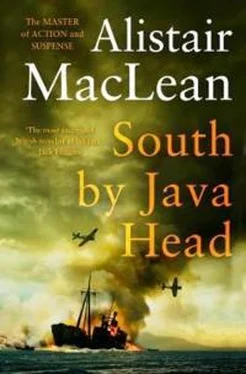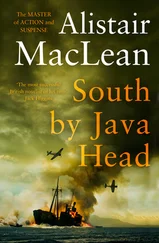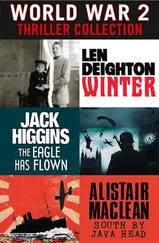“Why did you do it, Van Effen?” Nicolson stared down at the sick man and shook his head, slowly, wonderingly, from side to side. “Why in the name of heaven did you do it?”
“God only knows. Or maybe I know also.” He was breathing very rapidly, very shallowly, now, with only a few gasping words to every breath. “Total war is total war, Mr. Nicolson, but this is work for barbarians.” He gestured weakly at the blazing hut. “If any one of my countrymen could have been with me tonight, he would have done what I have done. We’re people, Mr. Nicolson, we’re just people.” He reached up one flaccid hand, pulled the opened shirt to one side, and smiled. “If you cut us, do we not bleed?” He burst into a paroxysm of bubbling, whooping coughs that contracted torn stomach muscles and lifted head and shoulders clear of the ground, then sank back again, so quiet, so still, that Nicolson stooped quickly forward, in sudden surety that the man was gone. But Van Effen lifted his eyelids again, with the slowness and infinite effort of a man raising a massive weight and smiled at Nicolson through filmed and misted eyes.
“We Germans do not go easily. This is not the end of van Effen.” He paused for a long moment, went on in a whisper: “Winning a war costs a great deal. It always costs a great deal. But sometimes the cost is too high, and it is not worth the price. Tonight the cost, the price asked, was far too high. I– I could not pay the price.”
A great gout of flame shot up from the roof of the council house, bathing his face in its red and savage glare, then it died down again and his face was white and still and he was murmuring something about Kiseki.
“What is it?” Nicolson was so low over him now that their faces were almost touching. “What did you say?”
“Colonel Kiseki.” Van Effen’s voice was very far away. He tried to smile again, but it was only a pathetic twitch of his lower lip. “Perhaps we have something in common. I think–” Here his voice faded into nothingness, then came again, strongly. “I think we both have a weakness for very little children.”
Nicolson stared down at him, then twisted round as a loud, rending crash echoed across the kampong and a sheet of flame leapt up, a flame that illumined every remotest corner of the little village. The council house, its last supports burnt out, had collapsed in on itself and was burning more furiously than ever. But only for a moment. Even as Nicolson watched the licking tongues of flame shrank back down towards the earth and the dark gloomy shadows crept forward from every side. Nicolson looked away and bent down to talk again to Van Effen, but Van Effen was unconscious.
Slowly, wearily, Nicolson straightened himself, but remained sunk on his knees, staring down at the grievously wounded man. All at once the exhaustion, the despair and the sharp, fiery agony of his legs and feet and arms flooded in on him and the temptation to let himself go, to slip into the friendly, embracing darkness that hovered round the woolly, shadowed edges of his mind was almost overpowering. He was actually swaying backwards and forwards on his knees, eyes all but closed and his arms swinging limply from his shoulders, when he heard a voice shouting, the sound of feet thudding across the kampong at a dead run and felt the hard urgent fingers biting cruelly through the red charred skin of his upper arm.
“Come on, sir, come on! For God’s sake get to your feet!” There was a fierceness, a burning desperation in McKinnon’s voice that Nicolson had never heard before, “They’ve got them, sir. Those yellow devils have taken them away!”
“What? What?” Nicolson shook his aching fuzzy head from side to side. “They’ve taken what away? The plans, the diamonds? They’re welcome to all–”
“I hope the diamonds go to hell and roast there with every little yellow bastard in the East.” McKinnon was half-sobbing, half-shouting at the top of his voice in a voice Nicolson had never heard before, his eyes were flooded with tears, his great fists white-knuckled by his side, and he was quite mad, insane with rage.
“It’s not only the diamonds they’ve taken, sir, I wish to God it was. The inhuman devils have taken hostages with them, I saw them throw them into their truck. The captain, Miss Drachmann and that poor wee boy!”
BEYOND ANGER lies fury, the heedless, ungovernable rage of the berserker, and beyond that again, a long, long step beyond the boundary of madness, lies the region of cold and utterly uncaring indifference. When a man enters that region, as few ever do, he is no longer himself, he is a man beside himself, a man outwith all his normal codes and standards of feeling and thought and emotions, a man for whom words like fear and danger and suffering and exhaustion are words that belong to another world and whose meaning he can no longer comprehend. It is a state characterised by an abnormally heightened clarity of mind, by a hyper-sensitive perception of where danger lies, by a total and unhuman disregard for that danger. It is, above all, a state characterised by an utter implacability. It was in such a state that Nicolson found himself at half-past eight on the evening of that day in late February, seconds only after McKinnon had told him that Gudrun and Peter were gone.
His mind was clear, unnaturally so, swiftly weighing up the situation as far as he knew it, balancing the possibilities and the probabilities, racing ahead and formulating the only plan that could offer any hope at all of success. His weariness, the sheer physical exhaustion, had dropped from him like a falling cloak: he knew the change was psychological, not physiological, that he would pay heavily for it later, but it didn’t matter, he was oddly certain that no matter what the source of his energy, it would carry him through. He was still aware, remotely, of the severe burns on his legs and arms, of the pain in his throat where the Japanese bayonet had bitten in so deeply, but his awareness was no more than an intellectual acknowledgment of these burns and wounds, they might well have belonged to another man.
His plan was simple, suicidally simple, and the chances of failure so high that they seemed inevitable, but the thought of failure never entered his mind. Half a dozen questions fired at Telak, the same at McKinnon and he knew what he must do, what everyone must do if there was to be any hope at all. It was McKinnon’s story that settled the problem for him.
The council house had blazed so fiercely, had gone up with such incredible speed, for one reason only – McKinnon had saturated the whole windward wall with the contents of a four-gallon can of petrol. He had stolen this from the Japanese truck within a couple of minutes of its arrival – the driver had kept careless watch and was now lying on the ground, less than ten feet away – and he had been just on the point of setting fire to it when a patrolling sentry had almost literally stumbled across him. But he had done more than steal the petrol, he had tried to immobilise the truck. He had searched for the distributor, failed to find it in the darkness, but had located the carburettor intake fuel line, and the soft copper had bent like putty in his hands. It seemed unlikely, impossible rather, that the truck could get much more than a mile on the cupful of fuel that remained – and it was four miles to the town of Bantuk.
Quickly, Nicolson asked Telak for co-operation, and got it at once. With his father and several of his tribesmen dead, neutrality no longer existed for Telak.
He said little, but what little he did say was bitter and savage and concerned with nothing but vengeance. He nodded immediate compliance to Nicolson’s request that he provide a guide to lead the main party – only seven now, all told, under the leadership of Vannier – via the main road to Bantuk, where they were to seize and board the launch, if this could be done in absolute silence, and rapidly translated to one of his tribesmen, giving him the rendezvous. He then ordered half a dozen of his men to search the dead Japanese soldiers lying around the kampong and to bring all their weapons and ammunition to a central spot. A tommy-gun, two automatic rifles and a strange automatic pistol proved to be still serviceable. Telak himself disappeared into a nearby hut and emerged with two Sumatran parangs , honed to razor-sharp edges, and a couple of curious, elaborately-chased daggers, ten inches long and shaped like a flame, which he stuck in his own belt. Within five minutes of the destruction of the council house, Nicolson, McKinnon and Telak were on their way.
Читать дальше
Конец ознакомительного отрывка
Купить книгу










